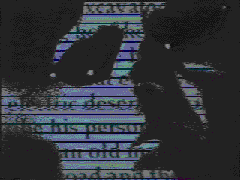I spent hours last night, lost in the surreal world that is Mark Amerika’s Grammatron. Not knowing how to approach this unique piece, I did the only thing I could think of and dived right in. I looked at the “about” page, clicked begin, then clicked the first link I was prompted with, marked ‘high bandwidth version,’ because heck, compared to the internet of ’97, I should hope my rig will hold up. A new window pops up, blaring surreal synth music and artificially altered vocals, I’m redirected to a web page with bright, clashing colors, distorted cyber-punk images, and text that appears just a little faster than I can comfortably read them. The assault of strangely retro-future-cyberspeak and neologisms, along with trying to process the unusualy pictures and understand the voice playing in the background, created an uncomfortable disorientation as my brain struggled to keep up with all the information being presented. Then just when I became accustomed to it, it stopped…
The rest of my experience with Grammatron what, in comparison to the previous multi-media onslaught, could be called a more traditional HyperText experience. Text appeared on the page in front of me, only periodically punctuated with images and audio. The blue hyperlinks in the text prompted me to continue the narrative, but as I struggled to understand the meaning of the words in front of me, I found myself clicking links randomly, hoping to progress the story in some way and hopefully find clarity.
The text seemed to circle in on itself, never quite the same, becoming more legible as time went on. Looking back, I’m unsure how much of the actual text changed and how much of it was merely my perception with my growing understanding of the strange world of Grammatron. My previous experiences with kabbalah and cyberpunk tropes helped me little at first as I attempted to reconcile the metaphysical and digital aspects of the story, as well as the overtly sexual aspects of the narrative. But sure enough, it started to make a strange sort of sense.
The next day, I’m looking back and trying to remember my experience going through Grammatron. The details of the narrative still seems largely unclear to me, as well as the finer aspects of the world-building. What I’m left with is more an impression, an impression of being lost in a sensory whirlwind, a struggling for clarity that seemed to mirror the bizarre protagonist.
HyperText fiction has a unique ability to allow us to tap into and interact with the experience of a story. In Grammatron, the viewer is thrown into the stream-of-consciousness of Golam’s inner thoughts. The use of multi-media, both audio and video, are made of excellent use to help reinforce this. Although chaotic, the experience is certainly carefully constructed, and I know I’m hitting just the tip of the proverbial iceberg.

I’m glad you liked this. Your response is spot on!
W